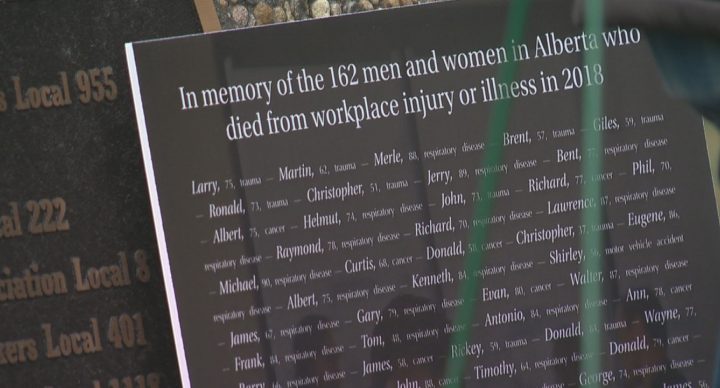Albertans marked the International Day of Mourning on Sunday, commemorating 162 workers who died in 2018 while highlighting the need for safer and healthier practices to protect employees.

Edmonton
Names, ages and causes of death — respiratory disease, trauma, cancer and vehicle accident — were read aloud at Grant Notley Park on Sunday.
Greg Mady, president of Edmonton and District Labour Council, said that 162 only counts people who died in Workers’ Compensation Board-covered workplaces.
“We’ll never really have a true idea of how many people died in this case, but that’s the number,” he said.
In 2017, 166 people died, according to the WCB.
“Unfortunately, we’re not seeing much progress in any significant decline, which is why we always say that today we mourn, but tomorrow we fight,” Mady said.
After getting hurt on the job, Mady spent a month in hospital and 11 months in rehab to get back to work. He’s never felt the same.

Get weekly health news
Mady said local health and safety committees in Alberta are the only way to get empowered and refuse unsafe work.
“It’s really important to point it out, to flag it and to refuse, even though [it] might seem like it’s not worth it. Let me tell you, you do not want to suffer even a terrible injury at work,” he said. “It’s just not worth it.”
If employees have questions about workplace health, they can reach out to the Alberta Workers’ Health Centre. To understand workers’ rights, contact the Alberta Labour Relations Board.
Calgary
Different districts laid wreaths and offered a moment of silence for those who have been injured, disabled or killed because of work-related incidents, illnesses and occupational diseases at SAIT on Sunday.
Alex Shevalier, president of the Calgary and District Labour Council, said occupational illnesses usually account for about three-quarters of deaths.
“I think it’s important that we focus on the health side, because I think there’s been a lot of great focus over the years on the safety side, which is making sure that processes don’t injure people and making sure that people are doing their job in a safe way,” Shevalier said.
“But a lot of people work with a lot of different chemicals and we don’t necessarily know what the long-term effects of a lot of those chemicals are, and we see that reflected in the number each year.”
While changes to the Occupational Health and Safety Act came into effect in June 2018 — the first update in nearly 40 years — Shevalier is concerned that the incoming United Conservative provincial government will repeal parts of Bill 6, farm safety legislation.
“Farm workers, prior to the NDP, had no rights at work, so the only option they had was to sue,” he said.
In 1991, the Canadian government passed the Workers Mourning Day Act to make April 28 the official Day of Mourning.




Comments